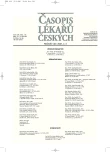The Role of Complement in Autoimmune Thyroid Disorders
Vztah komplementu a autoimunitních onemocnění štítné žlázy
Komplementový systém je důležitou součástí vrozené imunity. Ačkoli u systémových autoimunitních chorob je jeho účinek spíše protektivní, při autoimunitních zánětech štítné žlázy aktivně napadá tyreocyty, které exprimují řadu složek komplementu a komplementových inhibitorů. Aktivace klasické cesty komplementu je ve tkáni štítné žlázy započata buď protilátkami proti antigenům štítné žlázy ve formě imunokomplexů, nebo vazbou složky komplementu C4 na tyreoidální peroxidázu, anebo přímou aktivací reaktivními kyslíkovými radikály. Tyreocyty jsou proti útoku komplementu rezistentní; při napadení však uvolňují prozánětlivé cytokiny a reaktivní kyslíkové radikály, vedoucí k progresi zánětu. Klinický význam komplementu u autoimunitních zánětů štítné žlázy byl dosud sledován pouze u poporodní tyreoiditidy. Přes jistý pokrok však zůstává role komplementového systému v etiopatogenezi autoimunitních procesů málo poznána.
Klíčová slova:
komplement, autoimunitní tyreoiditidy, tyreoidální peroxidáza, cytokiny.
Authors:
E. Potluková; Z. Límanová
Authors‘ workplace:
III. interní klinika 1. LF UK a VFN, Praha
Published in:
Čas. Lék. čes. 2007; 146: 210-214
Category:
Review Article
Overview
The complement system is a crucial part of the innate immune system. In systemic autoimmune disorders, its effects tend to be protective. On the contrary, in the autoimmune thyroid disorders (AIT) the complement actively attacks thyrocytes, which express a number of complement components as well as complement inhibitory molecules. According to the experimental studies different ways of complement activation might occur in the thyroid tissue. All ensue via the classical pathway that is started either by immune complexes containing complement activating autoantibodies against thyroid autoantigens, or by direct binding of C4 to the molecule of thyroid peroxidase (TPO); or by direct complement activation by reactive oxygen radicals. Thyrocytes are relatively resistant to the complement attack. However, sublethaly injured thyrocytes release proinflammatory cytokines and reactive oxygen radicals and thus promote the inflammatory process in the thyroid. So far, the clinical significance of the complement in the thyroid has been studied only in postpartum thyroiditis. The exact role of complement in the pathogenesis of AIT remains to be elucidated.
Key words:
complement autoimmune thyroiditis, thyroid peroxidase, cytokines.
Labels
Addictology Allergology and clinical immunology Angiology Audiology Clinical biochemistry Dermatology & STDs Paediatric gastroenterology Paediatric surgery Paediatric cardiology Paediatric neurology Paediatric ENT Paediatric psychiatry Paediatric rheumatology Diabetology Pharmacy Vascular surgery Pain management Dental HygienistArticle was published in
Journal of Czech Physicians

- Advances in the Treatment of Myasthenia Gravis on the Horizon
- Possibilities of Using Metamizole in the Treatment of Acute Primary Headaches
- Metamizole at a Glance and in Practice – Effective Non-Opioid Analgesic for All Ages
- Metamizole vs. Tramadol in Postoperative Analgesia
- Spasmolytic Effect of Metamizole
-
All articles in this issue
- The Polycystic Ovary Syndrome and Its Male Equivalent
- Polyglandular Activation of Autoimmunity as a Manifestation of Subclinical Endocrinopathies
- Evaluation of Results of Iodine Prophylaxis in Czech Republic
- Diabetes Mellitus in Adult Patients with Type 1 Diabetes Shows Immunological, Functional and Clinical Differences Depending on the Presence of Autoimmune Thyroiditis
- Endocrine Orbitopathy and Significance of Autoantibodies Against 1D Protein
- Influence of Early Postnatal Nutrition in Preterm Infants on Their Anthropometric and Hormonal Characteristics at the Age of 10 Years
- Relationships Between the „Eating Inventory“ Factors, Socioeconomic Status, Anthropometric Body Adiposity Indexes and Health Risks in Czech Population
- Levels of Hormones in Plasma and in Synovial Fluid of Knee Joint of Patients with Rheumatoid Arthritis
- The Institute of Endocrinology Celebrates its 50th Anniversary. How is the Institute Poised for the Next 50 Years?
- Half Century of the Continuation of the Institute of Endocrinology in Prague
- History, Presence and Trends of Steroid Endocrinology
- Study of the Genetic Causes of Polygenetically Determined Endocrinopathies – Patience Can Bring Success
- Growth Hormone Treatment in the Institute of Endocrinology
- The Role of Complement in Autoimmune Thyroid Disorders
- Quality of Life in the Patients with Disorders of Sexual Development and with Y Chromosome in Karyotype
- Polycystic Ovary Syndrome in 2006
- Neurosteroids and Their Function
- Regulatory Network of Transcription Factors: Their Key Role in the Development and Function of Pancreas
- Genetic Background of Mitochondrial Diabetes
- Obesity Based on Mutation of Genes Involved in Energy Balance
- Osteoporosis and Aterosclerosis – is there Any Pathogenetic Association?
- Journal of Czech Physicians
- Journal archive
- Current issue
- About the journal
Most read in this issue
- Neurosteroids and Their Function
- Relationships Between the „Eating Inventory“ Factors, Socioeconomic Status, Anthropometric Body Adiposity Indexes and Health Risks in Czech Population
- Obesity Based on Mutation of Genes Involved in Energy Balance
- Growth Hormone Treatment in the Institute of Endocrinology
